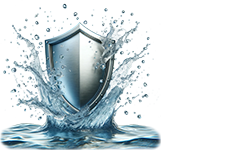Installing a full house water filter system isn’t just about water quality—it’s about taking full control of your home’s environment. From cooking and cleaning to bathing and drinking, every faucet becomes a source of confidence. If you’ve ever questioned what’s really in your water, now’s the time to stop wondering and start filtering at the source.
Harsh minerals. Chlorine. Sediment. Odors. Unseen contaminants. They creep in silently and disrupt everything—from skin health and appliance performance to the taste of your morning coffee. Most people only treat their drinking water. That leaves the rest of the home vulnerable to daily exposure.
When Partial Solutions Just Aren’t Enough
Let’s say you’ve got a fridge filter or maybe even a filtered pitcher. You’re covered in the kitchen—but what about when you shower? When you brush your teeth? When your kids fill up their water bottles at the bathroom sink?
Unfiltered water can contain chlorine, VOCs (volatile organic compounds), rust, sulfur, iron, and more. These substances don’t just smell bad or taste odd—they can irritate skin, stain fixtures, damage pipes, and prematurely wear out your appliances.
Even if you’re not experiencing noticeable effects yet, long-term exposure gradually takes its toll. A full house water filter system is the only method that ensures every point of water entry in your home is protected—no blind spots, no missed contaminants.
How a Full House Water Filter System Works
Unlike single-point filters, a full house setup is installed where water first enters your home—also known as the point-of-entry (POE). It treats all the water before it reaches any tap, appliance, or line.
Key Components:
Pre-filter: Removes sediment, dirt, and rust—essential for protecting the more sensitive stages that follow.
Carbon or KDF filter: Neutralizes chlorine, pesticides, herbicides, and industrial pollutants.
Optional UV light: Destroys bacteria and viruses for an extra layer of microbial defense.
Post-filtration polish: Improves taste and clarity before the water flows through your home.
This multi-stage approach ensures water is clean, clear, and chemically balanced—before it ever touches your skin or enters your mouth.
Full House Water Filter System vs. Other Filtration Methods
| Feature | Full House System | Under-Sink Filter | Faucet/Pitcher Filter |
|---|---|---|---|
| Whole-home coverage | ✅ Yes | ❌ No | ❌ No |
| Removes chlorine & VOCs | ✅ Yes | ✅ Limited | ✅ Limited |
| Reduces sediment/rust | ✅ Yes | ❌ No | ❌ No |
| Improves taste | ✅ Yes | ✅ Yes | ✅ Yes |
| Protects plumbing/appliances | ✅ Yes | ❌ No | ❌ No |
This isn’t just about drinking water—it’s about everything your water touches.
Best Applications for a Full House Water Filter System
1. City Water Users
Municipal treatment facilities often rely on chlorine and chloramine to disinfect water. These chemicals linger and can cause dryness, respiratory irritation, and unpleasant odors.
A full house system neutralizes those substances before they enter your pipes, giving you safer water for bathing, cooking, and even laundry.
2. Well Water Users
If your water comes from a private well, you’re responsible for its quality. Common contaminants include iron, sulfur, manganese, and harmful bacteria.
A properly designed system can include sediment filters, iron removal media, and even UV sterilization to handle biological threats.
Choosing the Right Full House Water Filter System
Not every system fits every home. Here’s how to make sure yours meets your specific needs:
1. Know Your Water
Start with a professional water test. This identifies specific contaminants—like iron, hardness minerals, VOCs, or bacteria—and ensures you invest in a system that solves your water issues.
2. Match Filter Type to Contaminants
Activated carbon: Best for chlorine, taste, and odor.
Catalytic carbon or KDF: Ideal for chloramine, VOCs, and heavy metals.
Sediment filters: Essential for physical particles and protecting other stages.
UV purification: Necessary for microbial protection in well water.
3. Check Flow Rate and Capacity
If you have multiple bathrooms or a large household, make sure the system supports high flow (at least 10–15 gallons per minute) and has a large filtering capacity.
FAQs: Get Clear Answers Fast
Q: How long do full house filters last?
Sediment filters typically last 3–6 months. Carbon media lasts 6 months to 1 year. Some systems last up to 10 years depending on usage and media type.
Q: Does this replace a water softener?
No, filtration and softening serve different functions. Filters remove contaminants. Softeners remove minerals that cause hardness. Many homes need both.
Q: Is a full house water filter system hard to maintain?
Most systems require minimal upkeep—just periodic filter changes. Many come with see-through housings, pressure gauges, or smart alerts to make it easy.
Q: Will I notice a difference right away?
Absolutely. Most homeowners report immediate improvement in taste, odor, and even the way their skin feels after a shower.
The Real-World Benefits You Can Expect
✓ Healthier, chemical-free water from every tap
✓ Protection for pipes, appliances, and water heaters
✓ Better skin and hair hydration
✓ Cleaner laundry without staining
✓ No more bottled water dependency
✓ Peace of mind knowing your water is safe
It’s not just an upgrade—it’s a full-spectrum transformation for your home.
Make the Shift to Total Home Water Confidence
You wouldn’t settle for partial protection in any other area of your life—why let your water be the exception?
A full house water filter system offers unmatched protection, comfort, and clarity—transforming your entire household’s water supply from the moment it enters your home. Whether you’re on city water or a private well, this is your long-term strategy for health, efficiency, and peace of mind.
Call Safe Water Solutions today. We’ll come to your home, test your water for free, and show you exactly what you’re dealing with—then recommend the perfect full house water filter system to meet your needs.
Water is life. Make sure yours is the cleanest it can be.

